- Home
- E. F. Benson
The E. F. Benson Megapack Page 10
The E. F. Benson Megapack Read online
Page 10
I was sitting in front, finding the speed and the darkness extraordinarily exhilarating. A bright circle of light was cast by our lamps, fading into darkness in front, while at the sides, cut off by the casing of the lamps, the transition into blackness was sharp and sudden. Every now and then, across this circle of illumination some wild thing would pass: now a bird, with hurried flutter of wings when it saw the speed of the luminous monster, would just save itself from being knocked over; now a rabbit feeding by the side of the road would dash on to it and then bounce back again; but more frequently it would be a hare that sprang up from its feeding and raced in front of us. They seemed dazed and scared by the light, unable to wheel into the darkness again, until time and again I thought we must run over one, so narrowly, in giving a sort of desperate sideways leap, did it miss our wheels. Then it seemed that one started up almost from under us, and I saw, to my surprise, it was enormous in size, and in colour apparently quite black. For some hundred yards it raced in front of us, fascinated by the bright light pursuing it, then, like the rest, it dashed for the darkness. But it was too late, and with a horrid jolt we ran over it. At once Sefton slowed down and stopped, for Jim’s rule is to go back always and make sure that any poor run-over is dead. So, when we stopped, the chauffeur jumped down and ran back.
“What was it?” Jim asked me, as we waited. “A hare.”
Sefton came running back.
“Yes, sir, quite dead,” he said. “I picked it up, sir.”
“What for!”
“Thought you might like to see it, sir. It’s the biggest hare I ever see, and it’s quite black.”
It was immediately after this that we came to the track up to the house, and in a few minutes we were within doors. There we found that if “shooting-lodge” was a term unsuitable, so also was “farm-house,” so roomy, excellently proportioned, and well furnished was our dwelling, while the contentment that beamed from Buxton’s face was sufficient testimonial for the offices.
In the hall, too, with its big open fireplace, were a couple of big solemn bookcases, full of serious works, such as some educated minister might have left, and, coming down dressed for dinner before the others, I dipped into the shelves. Then—something must long have been vaguely simmering in my brain, for I pounced on the book as soon as I saw it—I came upon Elwes’s “Folklore of the North-West Highlands,” and looked out “Hare” in the index. Then I read:
“Nor is it only witches that are believed to have the power of changing themselves into animals… Men and women on whom no suspicion of the sort lies are thought to be able to do this, and to don the bodies of certain animals, notably hares… Such, according to local superstition, are easily distinguishable by their size and colour, which approaches jet black.”
I was up and out early next morning, prey to the vivid desire that attacks many folk in new places—namely, to look on the fresh country and the new horizons—and, on going out, certainly the surprise was great. For I had imagined an utterly lonely and solitary habitation; instead, scarce half a mile away, down the steep brae-side at the top of which stood our commodious farmhouse, ran a typically Scotch village street, the hamlet no doubt of Achnaleish.
So steep was this hill-side that the village was really remote; if it was half a mile away in crow-flying measurement, it must have been a couple of hundred yards below us. But its existence was the odd thing to me: there were some four dozen houses, at the least, while we had not seen half that number since leaving Lairg. A mile away, perhaps, lay the shining shield of the western sea; to the other side, away from the village, I had no difficulty in recognising the river and the loch.
The house, in fact, was set on a hog’s back; from all sides it must needs be climbed to. But, as is the custom of the Scots, no house, however small, should be without its due brightness of flowers, and the walls of this were purple with clematis and orange with tropæolum. It all looked very placid and serene and home-like.
I continued my tour of exploration, and came back rather late for breakfast. A slight check in the day’s arrangements had occurred, for the head keeper, Maclaren, had not come up, and the second, Sandie Ross, reported that the reason for this had been the sudden death of his mother the evening before. She was not known to be ill, but just as she was going to bed she had thrown up her arms, screamed suddenly as if with fright, and was found to be dead. Sandie, who repeated this news to me after breakfast, was just a slow, polite Scotchman, rather shy, rather awkward. Just as he finished—we were standing about outside the back-door—there came up from the stables the smart, very English-looking Sefton. In one hand he carried the black hare.
He touched his hat to me as he went in.
“Just to show it to Mr. Armytage, sir,” he said. “She’s as black as a boot.”
He turned into the door, but not before Sandie Ross had seen what he carried, and the slow, polite Scotchman was instantly turned into some furtive, frightened-looking man.
“And where might it be that you found that, sir?” he asked.
Now, the black-hare superstition had already begun to intrigue me.
“Why does that interest you?” I asked.
The slow Scotch look was resumed with an effort.
“It’ll no interest me,” he said. “I just asked. There are unco many black hares in Achnaleish.”
Then his curiosity got the better of him.
“She’d have been nigh to where the road passes by and on to Achnaleish?” he asked.
“The hare? Yes, we found her on the road there.”
Sandie turned away.
“She aye sat there,” he said.
There were a number of little plantations climbing up the steep hill-side from Achnaleish to the moor above, and we had a pleasant slack sort of morning shooting there, walking through and ’round them with a nondescript tribe of beaters, among whom the serious Buxton figured. We had fair enough sport, but of the hares which Jim had seen in such profusion none that morning came to the gun, till at last, just before lunch, there came out of the apex of one of these plantations, some thirty yards from where Jim was standing, a very large, dark-coloured hare. For one moment I saw him hesitate—for he holds the correct view about long or doubtful shots at hares—then he put up his gun to fire. Sandie, who had walked ’round outside, after giving the beaters their instructions, was at this moment close to him, and with incredible quickness rushed upon him and with his stick struck up the barrels of the gun before he could fire.
“Black hare!” he cried. “Ye’d shoot a black hare? There’s no shooting of hares at all in Achnaleish, and mark that.”
Never have I seen so sudden and extraordinary a change in a man’s face: it was as if he had just prevented some blackguard of the street from murdering his wife.
“An’ the sickness about an’ all,” he added indignantly. “When the puir folk escape from their peching fevered bodies an hour or two, to the caller muirs.”
Then he seemed to recover himself.
“I ask your pardon, sir,” he said to Jim. “I was upset with ane thing an’ anither, an’ the black hare ye found deid last night—eh, I’m blatherin’ again. But there’s no a hare shot on Achnaleish, that’s sure.”
Jim was still looking in mere speechless astonishment at Sandie when I came up. And, though shooting is dear to me, so too is folk-lore.
“But we’ve taken the shooting of Achnaleish, Sandie,” I said. “There was nothing there about not shooting hares.”
Sandie suddenly boiled up again for a minute.
“An’ mebbe there was nothing there about shooting the bairns and the weemen!” he cried.
I looked ’round, and saw that by now the beaters had all come through the wood: of them Buxton and Jim’s valet, who was also among them, stood apart: all the rest were standing ’round us two with gleaming eyes and open mouths, hanging on the debate, and forced, so I imagined, from their imperfect knowledge of English to attend closely in order to catch the drift of what went on.
Every now and then a murmur of Gaelic passed between them, and this somehow I found peculiarly disconcerting.
“But what have the hares to do with the children or women of Achnaleish?” I asked.
There was no reply to this beyond the reiterated sentence: “There’s na shooting of hares in Achnaleish whatever,” and then Sandie turned to Jim.
“That’s the end of the bit wood, sir,” he said. “We’ve been a’roound.”
Certainly the beat had been very satisfactory. A roe had fallen to Jim (one ought also to have fallen to me, but remained, if not standing, at any rate running away). We had a dozen of black-game, four pigeons, six brace of grouse (these were, of course, but outliers, as we had not gone on to the moor proper at all), some thirty rabbits, and four couple of woodcock. This, it must be understood, was just from the fringe of plantations about the house, but this was all we meant to do today, making only a morning of it, since our ladies had expressly desired first lessons in the art of angling in the afternoon, so that they too could be busy. Excellently too had Sandie worked the beat, leaving us now, after going, as he said, all ’round, a couple of hundred yards only from the house, at a few minutes to two.
So, after a little private signalling from Jim to me, he spoke to Sandie, dropping the hare-question altogether.
“Well, the beat has gone excellently,” he said, “and this afternoon we’ll be fishing. Please settle with the beaters every evening, and tell me what you have paid out. Good morning to you all.”
We walked back to the house, but the moment we had turned a hum of confabulation began behind us, and, looking back, I saw Sandie and all the beaters in close whispering conclave. Then Jim spoke.
“More in your line than mine,” he said; “I prefer shooting a hare to routing out some cock-and—bull story as to why I shouldn’t. What does it all mean?”
I mentioned what I had found in Elwes last night.
“Then do they think it was we who killed the old lady on the road, and that I was going to kill somebody else this morning?” he asked. “How does one know that they won’t say that rabbits are their aunts, and woodcock their uncles, and grouse their children? I never heard such rot, and tomorrow we’ll have a hare drive. Blow the grouse! We’ll settle this hare-question first.”
Jim by this time was in the frame of mind typical of the English when their rights are threatened. He had the shooting of Achnaleish, on which were hares, sir, hares. And if he chose to shoot hares, neither papal bull nor royal charter could stop him.
“Then there’ll be a row,” said I, and Jim sniffed scornfully.
At lunch Sandie’s remark about the “sickness,” which I had forgotten till that moment, was explained.
“Fancy that horrible influenza getting here,” said Madge. “Mabel and I went down to the village this morning, and, oh, Ted, you can get all sorts of things, from mackintoshes to peppermints, at the most heavenly shop, and there was a child there looking awfully ill and feverish. So we inquired: it was the ‘sickness’—that was all they knew. But, from what the woman said, it’s clearly influenza. Sudden fever, and all the rest of it.”
“Bad type?” I asked.
“Yes; there have been several deaths already among the old people from pneumonia following it.”
Now, I hope that as an Englishman I too have a notion of my rights, and attempt anyhow to enforce them, as a general rule, if they are wantonly threatened. But if a mad bull wishes to prevent my going across a certain field, I do not insist on my rights, but go ’round instead, since I see no reasonable hope of convincing the bull that according to the constitution of my country I may walk in this field unmolested. And that afternoon, as Madge and I drifted about the loch, while I was not employed in disentangling her flies from each other or her hair or my coat, I pondered over our position with regard to the hares and men of Achnaleish, and thought that the question of the bull and the field represented our standpoint pretty accurately. Jim had the shooting of Achnaleish, and that undoubtedly included the right to shoot hares: so too he might have the right to walk over a field in which was a mad bull. But it seemed to me not more futile to argue with the bull than to hope to convince these folk of Achnaleish that the hares were—as was assuredly the case—only hares, and not the embodiments of their friends and relations. For that, beyond all doubt, was their belief, and it would take, not half an hour’s talk, but perhaps a couple of generations of education to kill that belief, or even to reduce it to the level of a superstition. At present it was no superstition—the terror and incredulous horror on Sandie’s face when Jim raised his gun to fire at the hare told me that—it was a belief as sober and commonplace as our own belief that the hares were not incarnations of living folk in Achnaleish.
Also, virulent influenza was raging in the place, and Jim proposed to have a hare-drive tomorrow! What would happen?
That evening Jim raved about it in the smoking-room.
“But, good gracious, man, what can they do?” he cried. “What’s the use of an old gaffer from Achnaleish saying I’ve shot his grand-daughter and, when he is asked to produce the corpse, telling the jury that we’ve eaten it, but that he has got the skin as evidence? What skin? A hare-skin! Oh, folklore is all very well in its way, a nice subject for discussion when topics are scarce, but don’t tell me it can enter into practical life. What can they do?”
“They can shoot us,” I remarked.
“The canny, God-fearing Scotchmen shoot us for shooting hares?” he asked.
“Well, it’s a possibility. However, I don’t think you’ll have much of a hare-drive in any case.”
“Why not?”
“Because you won’t get a single native beater, and you won’t get a keeper to come either.”
“You’ll have to go with Buxton and your man.”
“Then I’ll discharge Sandie,” snapped Jim.
“That would be a pity: he knows his work.”
Jim got up.
“Well, his work tomorrow will be to drive hares for you and me,” said Jim. “Or do you funk?”
“I funk,” I replied.
The scene next morning was extremely short. Jim and I went out before breakfast, and found Sandie at the back door, silent and respectful. In the yard were a dozen young Highlanders, who had beaten for us the day before.
“Morning, Sandie,” said Jim shortly. “We’ll drive hares today. We ought to get a lot in those narrow gorges up above. Get a dozen beaters more, can you?”
“There will be na hare-drive here,” said Sandie quietly.
“I have given you your orders,” said Jim.
Sandie turned to the group of beaters outside and spoke half a dozen words in Gaelic. Next moment the yard was empty, and they were all running down the hillside towards Achnaleish.
One stood on the skyline a moment, waving his arms, making some signal, as I supposed, to the village below. Then Sandie turned again.
“An’ whaur are your beaters, sir?” he asked.
For the moment I was afraid Jim was going to strike him. But he controlled himself.
“You are discharged,” he said.
The hare-drive, therefore, since there were neither beaters nor keeper—Maclaren, the head-keeper, having been given this “dayoff” to bury his mother—was clearly out of the question, and Jim, still blustering rather, but a good bit taken aback at the sudden disciplined defection of the beaters, was in betting humour that they would all return by tomorrow morning. Meanwhile the post which should have arrived before now had not come, though Mabel from her bedroom window had seen the post-cart on its way up the drive a quarter of an hour ago. At that a sudden idea struck me, and I ran to the edge of the hog’s back on which the house was set. It was even as I thought: the post-cart was just striking the high-road below, going away from the house and back to the village, without having left our letters.
I went back to the dining-room. Everything apparently was going wrong this morning: the bread was stale, the milk was not fresh,
and the bell was rung for Buxton. Quite so: neither milkman nor baker had called.
From the point of view of folk-lore this was admirable.
“There’s another cock-and-bull story called ‘taboo,’” I said. “It means that nobody will supply you with anything.”
“My dear fellow, a little knowledge is a dangerous thing,” said Jim, helping himself to marmalade.
I laughed.
“You are irritated,” I said, “because you are beginning to be afraid that there is something in it.”
“Yes, that’s quite true,” he said. “But who could have supposed there was anything in it? Ah, dash it! there can’t be. A hare is a hare.”
“Except when it is your first cousin,” said I.
“Then I shall go out and shoot first cousins by myself,” he said. That, I am glad to say, in the light of what followed, we dissuaded him from doing, and instead he went off with Madge down the burn. And I, I may confess, occupied myself the whole morning, ensconced in a thick piece of scrub on the edge of the steep brae above Achnaleish, in watching through a field-glass what went on there. One could see as from a balloon almost: the street with its houses was spread like a map below.
First, then, there was a funeral—the funeral, I suppose, of the mother of Maclaren, attended, I should say, by the whole village. But after that there was no dispersal of the folk to their work: it was as if it was the Sabbath; they hung about the street talking. Now one group would break up, but it would only go to swell another, and no one went either to his house or to the fields.
Then, shortly before lunch, another idea occurred to me, and I ran down the hill-side, appearing suddenly in the street, to put it to the test. Sandie was there, but he turned his back square on me, as did everybody else, and as I approached any group talk fell dead. But a certain movement seemed to be going on; where they stood and talked before, they now moved and were silent.
Soon I saw what that meant. None would remain in the street with me: every man was going to his house.

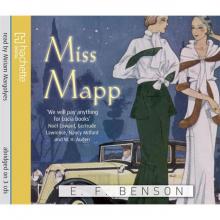 Miss Mapp
Miss Mapp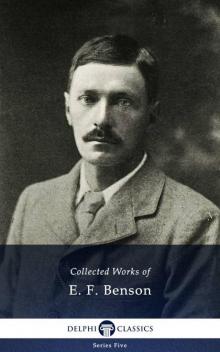 Works of E F Benson
Works of E F Benson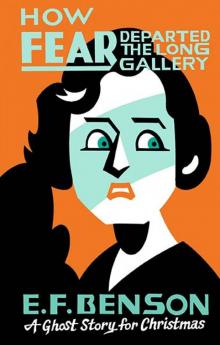 How Fear Departed the Long Gallery
How Fear Departed the Long Gallery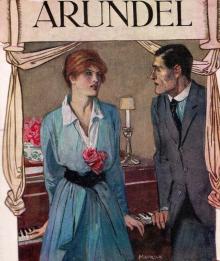 Dodo's Daughter: A Sequel to Dodo
Dodo's Daughter: A Sequel to Dodo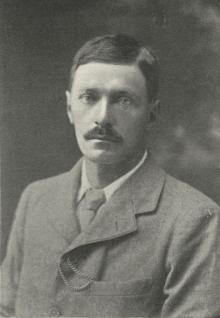 The House of Defence v. 1
The House of Defence v. 1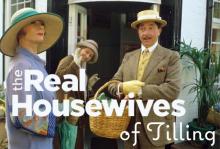 Queen Lucia
Queen Lucia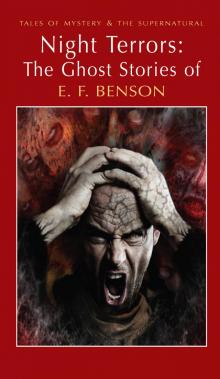 Night Terrors
Night Terrors Lucia Victrix
Lucia Victrix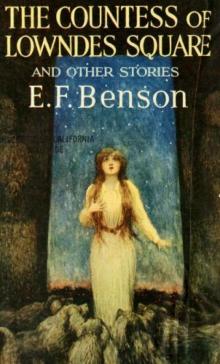 The Countess of Lowndes Square and Other Stories
The Countess of Lowndes Square and Other Stories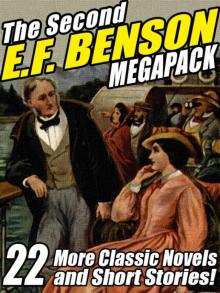 The Second E. F. Benson Megapack
The Second E. F. Benson Megapack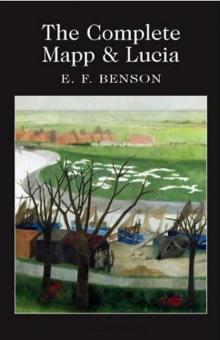 The Complete Mapp & Lucia
The Complete Mapp & Lucia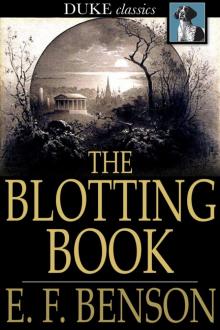 The Blotting Book
The Blotting Book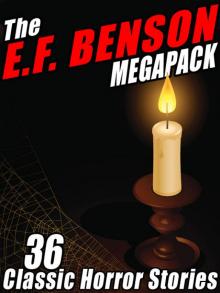 The E. F. Benson Megapack
The E. F. Benson Megapack Lucia Rising
Lucia Rising Ghost Stories
Ghost Stories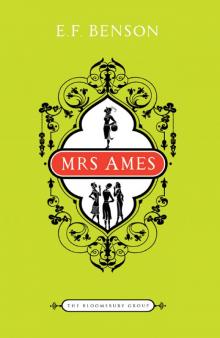 Mrs. Ames
Mrs. Ames E. F. Benson
E. F. Benson